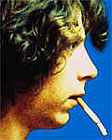|
|
|
|
Mullet
|
 |
|
David Caesar may be the only Australian filmmaker who has achieved more fame for his media appearances than for his movies. Better known as an occasional stirrer on TV's Race Around the World than as the author of Greenkeeping (1992) or Idiot Box (1996), Caesar has yet to fulfil the early promise of his distinctive shorts and documentaries, such as Carcrash (1995). At least Caesar has managed to keep practicing his craft as a director in television. This experience shows in Mullet, his best film to date. A controlled, charming piece, Mullet is squarely about the peculiarities of Australian behaviour – especially male behaviour. Not a lot happens in this deliberately low-key tale set in the fishing town of Coolawarra. Indeed, there is more than a whiff of the TV comedy-drama Seachange in Caesar's relaxed, mellow exploration of relationships. It is a determinedly character-driven piece, and for the most part succeeds on its chosen terrain. Eddie (Ben Mendelsohn) returns home, to the chagrin or amusement of almost everyone who knew him. He had the usual problems committing to his girlfriend, Tully (Susie Porter) and coping with his family, particularly his bickering parents, Gwen (Kris McQuade) and Col (Tony Barry). Now that Tully has married Eddie's brother, Pete (Andrew S. Gilbert), something has got to give. Tales of Australian male pathos – with an emphasis on the sensitive Aussie bloke who is not exactly Men's Movement material but nonetheless a damaged, yearning kind of guy – form a particular tradition in local cinema. Mullet's closest cousin is this regard is the work of Ray Argall (Return Home, 1990). There is a subtle but unmistakeable tug-of-war going on in these films: women (usually of the feisty variety) are duly acknowledged, but essentially elbowed out of the plot so that the blokes can lay claim to the deepest, most authentic emotions – that is, once they manage to overcome their inhibitions and callowness. The pleasure of this modest film comes from the well-chiselled humour of its small interactions. Dry, Aussie laconicism finds its poet laureate in Caesar, whose talents as a writer are beginning to match his skill as director. All members of the fine ensemble cast find a relaxed rhythm, and the film's style gives them all the room they need to explore the nuances of character. However, there are some false, miscalculated notes in the film, particularly on the level of directorial touches. Some quirky compositions (as in Risk, 2001) are forced. The constant metaphor of Eddie as a mullet (cue many shots of fish) becomes tiresome. The one unusual, brave aspect of the project – its quasi-musical interludes, when each character, in turn, humbly sings a well-known, Australian pop standard (such as "Boys in Town") without accompaniment – falls very flat, because it is insufficiently stylised and integrated. However, Mullet is a welcome, hugely entertaining relief after a deluge of poor Australian movies. Caesar's career shows that our promising, young talents should be allowed to get into their stride before being either praised to high heaven or cast into hell for their fledgling efforts. © Adrian Martin June 2001 |
![]()